
ZDM-Mathematics Education
Scope & Guideline
Elevating Pedagogical Strategies for Tomorrow's Classrooms
Introduction
Aims and Scopes
- Interdisciplinary Approaches to Mathematics Education:
The journal emphasizes the integration of mathematics with other disciplines, such as science, technology, engineering, and art (STEM), fostering a holistic educational approach. - Research on Teacher Education and Professional Development:
It explores effective strategies and frameworks for training mathematics teachers, focusing on their professional growth, pedagogical skills, and adaptive practices in diverse educational contexts. - Innovative Teaching Practices and Curriculum Development:
ZDM highlights innovative teaching methodologies, curriculum reforms, and the use of digital technologies to enhance mathematics education, providing educators with applicable strategies. - Equity, Diversity, and Inclusion in Mathematics Education:
The journal prioritizes research that addresses issues of equity and inclusion, aiming to understand and improve access to quality mathematics education for marginalized groups. - Theoretical Frameworks in Mathematics Education Research:
It discusses various theoretical perspectives, such as the anthropological theory of didactics and the onto-semiotic approach, contributing to a deeper understanding of mathematical learning processes. - Assessment and Evaluation in Mathematics Education:
ZDM covers research related to assessment practices, including formative and summative assessments, and their impact on student learning and teaching efficacy. - Cultural and Historical Contexts in Mathematics Education:
The journal recognizes the importance of cultural and historical dimensions in mathematics teaching, showcasing research that explores these influences on learning.
Trending and Emerging
- Digital Technologies in Mathematics Education:
There is a growing trend towards integrating digital tools and technologies in mathematics teaching, highlighting their role in enhancing student engagement and learning outcomes. - Equity and Inclusion Initiatives:
Research focusing on equitable access to mathematics education for underrepresented groups is increasingly prevalent, reflecting a broader societal emphasis on diversity and inclusion in educational settings. - Mathematics Teacher Professional Development:
The exploration of effective professional development models for mathematics teachers is gaining traction, with an emphasis on enhancing pedagogical skills and adapting to diverse classroom environments. - Collaborative Learning and Teacher Noticing:
Emerging research on collaborative learning practices and the importance of teacher noticing in understanding student thinking is becoming a significant focus, indicating a shift towards more interactive and responsive teaching approaches. - Mathematics in STEM Education:
The integration of mathematics within STEM education frameworks is on the rise, reflecting a growing recognition of the interconnectedness of these disciplines and their relevance to real-world problem solving. - Culturally Relevant Pedagogy:
There is an increasing emphasis on culturally responsive teaching practices that recognize and incorporate students' cultural backgrounds into mathematics education, promoting more meaningful learning experiences.
Declining or Waning
- Traditional Instructional Methods:
There is a noticeable decrease in research focusing on conventional teaching methods in favor of innovative and technology-enhanced practices. - Mathematics Competitions and Their Educational Impact:
While previously a popular topic, the focus on mathematics competitions has diminished, possibly indicating a shift towards evaluating broader educational outcomes rather than competition-driven achievements. - Historical Mathematics Education Research:
Research centered on the historical aspects of mathematics education appears to be waning, as the field increasingly prioritizes contemporary pedagogical strategies and technologies. - General Problem Solving without Contextualization:
Research that does not connect problem solving to real-world contexts or interdisciplinary applications is becoming less prominent, as the emphasis shifts towards applied mathematics and its relevance to students' lives.
Similar Journals

Asia-Pacific Education Researcher
Elevating scholarship in the heart of Asia-Pacific education.Asia-Pacific Education Researcher is a premier journal dedicated to advancing the field of education research, published by Springer Heidelberg. With an ISSN of 0119-5646 and E-ISSN 2243-7908, it serves as a crucial platform for innovative scholarship in educational practices and policies across the Asia-Pacific region. Positioned in the coveted Q1 category for Education in 2023 and boasting an impressive rank of #103 out of 1543 in the Scopus Social Sciences _ Education category, this journal is recognized for its commitment to high-quality research and impactful findings. The journal seeks to publish original research, empirical studies, and theoretical contributions that address key educational challenges and opportunities in diverse contexts. Aimed at researchers, educators, and policymakers, the Asia-Pacific Education Researcher is essential for fostering dialogue and collaboration within the global educational landscape.

International Electronic Journal of Mathematics Education
Transforming Educational Practices with Rigorous ResearchInternational Electronic Journal of Mathematics Education (IEJME) is a premier platform dedicated to advancing the field of mathematics education through rigorous research and innovation. Published by MODESTUM LTD, this interdisciplinary journal focuses on the pedagogical, theoretical, and empirical aspects of mathematics education, facilitating a deep understanding of teaching practices, learning methods, and curriculum development. With its commitment to open access, IEJME ensures that research findings are accessible to a global audience, fostering collaborative efforts among educators, researchers, and practitioners. The journal has maintained a commendable position in academic rankings, holding a Rank of #114/399 in General Mathematics and #782/1543 in Education within Scopus, highlighting its significant contribution to the scholarly community. By publishing high-quality research from 2009 to 2016 and 2021 to 2024, IEJME continues to serve as an essential resource for those invested in enhancing mathematical understanding in educational contexts, inspiring future generations of mathematicians and educators.
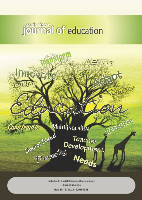
South African Journal of Education
Fostering impactful scholarship for a brighter educational future.The South African Journal of Education (ISSN: 0256-0100, E-ISSN: 2076-3433) is a premier peer-reviewed, open-access journal dedicated to advancing the field of education in South Africa and beyond. Published by the Education Association of South Africa, this journal has been a vital resource since its establishment, with open access status since 2007, allowing for broader dissemination of research findings and innovative educational practices. With a strong emphasis on empirical research, the journal aims to contribute to educational improvement and policy development while fostering scholarly dialogue among researchers, educators, and policymakers. As evidenced by its Scopus ranking of #883 out of 1543 in the Social Sciences Education category and a Q3 quartile designation as of 2023, the journal serves as a significant platform for high-quality, impactful research. Based in South Africa, it addresses critical issues in education relevant to the region and the international academic community. Through its commitment to accessible scholarship, the South African Journal of Education remains an essential resource for those seeking to enhance their understanding and practice in the field of education.
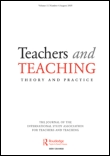
Teachers and Teaching
Unveiling New Perspectives in Arts and Humanities EducationTeachers and Teaching is a premier scholarly journal published by Routledge Journals, Taylor & Francis Ltd, providing an essential platform for researchers, educators, and practitioners in the fields of Education and Arts and Humanities. With an editorial focus on the dynamics of teaching and learning, the journal aims to share innovative research and insightful discussions that enhance pedagogical practices and policy development. Notably, it has achieved a Q1 ranking in both the Arts and Humanities and Education categories, signifying its impact and relevance in educational research, as reflected in its Scopus rankings, with an 84th percentile for Arts and Humanities and a 76th percentile in Education. Although it does not offer open access, the journal provides extensive access options for libraries and institutions, making its rich content available to a wide audience. Spanning from 1995 to 2024, Teachers and Teaching continues to set the standard for high-quality scholarship in the evolving landscape of education, inviting contributions that explore challenges and innovations in teaching methodologies.
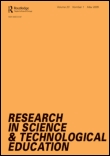
Research in Science & Technological Education
Innovating Pedagogy for Tomorrow's Scientists and TechnologistsResearch in Science & Technological Education, published by Routledge Journals, Taylor & Francis Ltd, is a leading international journal dedicated to advancing the field of education within the realms of science and technology. With its ISSN 0263-5143 and E-ISSN 1470-1138, this prestigious journal provides a platform for innovative and rigorous research from 1983 to the present, thus offering critical insights into pedagogical practices, curriculum development, and policy-making. Boasting a remarkable impact, it ranks in the top quartile (Q1) in both Education and Multidisciplinary categories as of 2023, with an impressive Scopus ranking of #270 out of 1543 in Social Sciences _ Education, placing it in the 82nd percentile. Researchers, educators, and students will find invaluable resources and discussions that shape the future of science and technological education in an increasingly complex world. Although this journal does not offer Open Access, it maintains a strong commitment to disseminating high-quality research, making it an essential read for those invested in the evolution of educational practices and outcomes in the STEM fields.
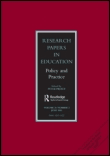
Research Papers in Education
Shaping the future of education with scholarly insights.Research Papers in Education is a leading academic journal dedicated to advancing the field of education through the dissemination of high-quality research. Published by ROUTLEDGE JOURNALS, TAYLOR & FRANCIS LTD, this journal, with an ISSN of 0267-1522 and E-ISSN 1470-1146, has been pivotal in shaping educational discourse since its inception in 1986. The journal is recognized in the Q1 quartile for Education in the 2023 rankings and boasts an impressive 91st percentile in Scopus rankings. While it operates under a traditional subscription model, its reach is enhanced by its commitment to scholarly rigor, making it an indispensable resource for researchers, professionals, and students alike. Covering a diverse range of topics including pedagogical strategies, policy analysis, and educational technology, Research Papers in Education facilitates critical dialogue and innovation in the educational landscape, contributing significantly to the ongoing conversation around effective teaching and learning practices.
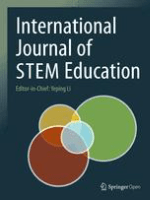
International Journal of STEM Education
Shaping the Future of STEM Learning GloballyThe International Journal of STEM Education, published by Springer, is a leading open-access journal dedicated to advancing the field of STEM (Science, Technology, Engineering, and Mathematics) education. With its ISSN 2196-7822 and e-ISSN 2196-7822, the journal has established a significant presence in its domain since its launch in 2014, operating with an increased depth of scholarship through 2024. Hailing from Switzerland and addressing a global audience, the journal has achieved a remarkable ranking of Q1 in Education for 2023, placing it in the top tier of its field. The journal is ranked 26th out of 1543 in Social Sciences - Education according to Scopus metrics, highlighting its influence in shaping contemporary educational practices. By offering a platform for high-quality research articles, reviews, and case studies, the International Journal of STEM Education aims to promote effective teaching methodologies and innovation in STEM pedagogy, catering to researchers, educators, and policy makers alike. The commitment to open access ensures that the knowledge generated is readily available, fostering collaboration and dissemination of cutting-edge developments in STEM education.
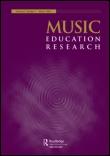
Music Education Research
Pioneering Research for Effective Music TeachingMusic Education Research is a prestigious journal dedicated to advancing scholarship in the field of music education, published by Routledge Journals, Taylor & Francis Ltd. With a significant impact factor reflected in its Q1 ranking in Music and Q2 in Education for 2023, this journal is a critical resource for researchers, educators, and practitioners alike. It consistently ranks high in both the Arts and Humanities and Social Sciences categories, with an impressive position of Rank #8 in Music out of 180 journals, indicating its influence in shaping contemporary discourse. Aimed at fostering innovation and critical examination within music education, Music Education Research invites submissions that explore a broad spectrum of topics, encompassing pedagogical practices, policy implications, and curriculum development. Operating from the United Kingdom, the journal provides a vital platform for sharing cutting-edge research and is committed to improving music learning experiences across various educational contexts.

International Journal of Education in Mathematics Science and Technology
Transforming educational outcomes through impactful research and practice.The International Journal of Education in Mathematics Science and Technology (ISSN: 2147-611X, E-ISSN: 2147-611X) is an esteemed publication dedicated to advancing knowledge and research in the fields of mathematics, science, and technology education. Published by Necmettin Erbakan University in Turkey, this journal serves as a vital platform for educators, researchers, and professionals to disseminate innovative methodologies, pedagogical strategies, and educational technologies. With a commendable Q2 ranking in both the Education and Mathematics categories for the year 2022, it clearly exemplifies its impact in these domains, boasting a Scopus rank of #19 out of 74 in Mathematics (miscellaneous) and a position in the 75th percentile. Although the journal has transitioned into open access, it remains committed to fostering a rich dialogue among scholars and practitioners dedicated to enhancing educational outcomes in mathematics and science. Researchers and educators interested in contributing to pedagogical advancements are encouraged to submit their work, thereby playing a part in influencing the future of education.

Teaching of Mathematics
Advancing Effective Strategies for Mathematics LearningTeaching of Mathematics is an esteemed open-access journal devoted to the field of mathematics education, published by DRUSTVO MATEMATICARA SRBIJE in Serbia. Since its inception in 1998, the journal aims to foster scholarly dialogue and disseminate research findings that contribute to the effective teaching and learning of mathematics. Although it currently holds a Q4 ranking in both Education and Miscellaneous Mathematics categories, the journal is dedicated to providing a platform for innovative pedagogical strategies, theoretical discussions, and empirical studies. With an ISSN of 1451-4966 and an E-ISSN of 2406-1077, Teaching of Mathematics offers open access to its content, ensuring that researchers, educators, and students can freely benefit from its contributions. As it converges towards 2024, the journal aspires to enhance its impact and influence within the mathematical education community, encouraging all stakeholders to share their insights and advancements in this critical area of study.